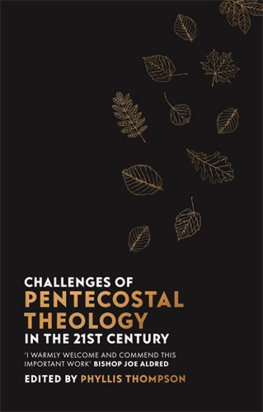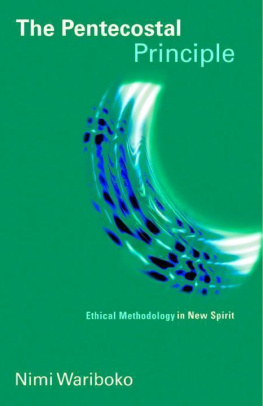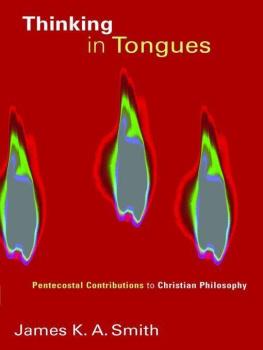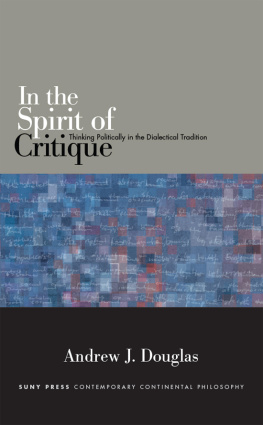Douglas Jacobsen - Thinking in the Spirit: Theologies of the Early Pentecostal Movement
Here you can read online Douglas Jacobsen - Thinking in the Spirit: Theologies of the Early Pentecostal Movement full text of the book (entire story) in english for free. Download pdf and epub, get meaning, cover and reviews about this ebook. year: 2009, genre: Religion. Description of the work, (preface) as well as reviews are available. Best literature library LitArk.com created for fans of good reading and offers a wide selection of genres:
Romance novel
Science fiction
Adventure
Detective
Science
History
Home and family
Prose
Art
Politics
Computer
Non-fiction
Religion
Business
Children
Humor
Choose a favorite category and find really read worthwhile books. Enjoy immersion in the world of imagination, feel the emotions of the characters or learn something new for yourself, make an fascinating discovery.
- Book:Thinking in the Spirit: Theologies of the Early Pentecostal Movement
- Author:
- Genre:
- Year:2009
- Rating:3 / 5
- Favourites:Add to favourites
- Your mark:
- 60
- 1
- 2
- 3
- 4
- 5
Thinking in the Spirit: Theologies of the Early Pentecostal Movement: summary, description and annotation
We offer to read an annotation, description, summary or preface (depends on what the author of the book "Thinking in the Spirit: Theologies of the Early Pentecostal Movement" wrote himself). If you haven't found the necessary information about the book — write in the comments, we will try to find it.
Thinking in the Spirit: Theologies of the Early Pentecostal Movement — read online for free the complete book (whole text) full work
Below is the text of the book, divided by pages. System saving the place of the last page read, allows you to conveniently read the book "Thinking in the Spirit: Theologies of the Early Pentecostal Movement" online for free, without having to search again every time where you left off. Put a bookmark, and you can go to the page where you finished reading at any time.
Font size:
Interval:
Bookmark:






MOVEMENT

DOUGLAS JACOBSEN

in memory of Oliver Jacobsen, 1896-1968 Andrea Jacobsen, 1899-1973 and Albert Jacobsen, 1925-2000
IX
XV
THIS BOOK is about the early years of the American pentecostal movement, beginning about 1900 and ending around 1925. It is about the ideas that defined that movement during these formative years and how a variety of creative pentecostal leaders rethought the Christian faith in light of their new experience of God.
While these pentecostal theologians were relatively well known within their own religious spheres of influence, they were almost entirely unknown beyond those narrow confines. If you weren't searching for them, pentecostals could easily be overlooked. This is understandable, given the size and social location of the movement. The early pentecostal movement involved only a tiny percentage of the Christian population in the United States: In 1925, that meant something like 100,000 believers in a nation of 100 million. Pentecostals were, for the most part, solid working-class folks, though some poorer and some wealthier individuals were mixed in. Geographically, they came from all over the nation. But virtually none came from the ranks of the blue-blooded East Coast intellectual elite. If pentecostals were going to make their voice heard in the larger society during the early years of the twentieth century, they were going to have to do it on their own. They had no high-culture coattails to ride to prominence.
But pentecostalism is no longer either small or socially invisible. It is the fastest-growing version of Christianity in the world, and the raw numbers are huge. Current estimates range from 300 to 500 million adherents worldwide. That means that as much as one-quarter of the world's Christians are now pentecostal-almost 10 percent of the earth's total population.' In North America, the number of people who can be identified as pentecostal or charismatic is roughly 80 million out of a Christian population of 260 million and a total population of about 310 million. As for public visibility, well-known figures such as Pat Robertson and John Ashcroft seem proof enough that pentecostals now rank among the power brokers of the nation (though it should be pointed out that not all pentecostals are conservative Republicans). In short, while intelligent observers of the American scene might justifiably have been able to ignore the Pentecostal movement seventy-five years ago, that is not an option today. Because of its sheer size and influence, pentecostalism now demands attention and, like any other religious movement, it needs to be understood from its intellectual roots.
This book focuses on the individuals who formed the original brain trust of this now gigantic religious movement. In a 25-year burst of creative energy at the beginning of the twentieth century, these leaders articulated almost all the basic theological ideas that continue to define the pentecostal message in the United States and around the world. Theology is only one part of any religious movement, however, so it would be wrong to claim too much. The pentecostal movement would never have succeeded if it had not been for the hard work of many institutional leaders and for the generous activism of the faithful. But the way a movement articulates its vision of the world, the way a religious tradition defines its theology, is critical. Ideas have consequences, and the theological ideas of the key figures discussed in this volume have had more consequential impact than most.
The heritage of early pentecostal theology is not neat and tidy. Early pentecostal thinkers sometimes disagreed vehemently with each other; as a result, they bequeathed to their followers a pluriform tradition of faith. Internal diversity, which still defines the movement as it begins its second century of existence, is part of what makes pentecostalism different from other theological traditions. To borrow a notion from Ann Swidler, Pentecostal theology is much more like a mixed tool kit of ideas than it is a tightly-reasoned doctrinal system.' And it is precisely this sense of theological adaptability-that is, if one idea doesn't work, use another-that has allowed the movement to span the globe so quickly. The ideas studied here have frequently been borrowed and appropriated in ways that were not necessarily foreseen or fully intended by the theologians who first proposed them. They have often been handed on without any theologian's name attached to them. They have been eclectically integrated into the thinking of a wide variety of pentecostal communities in North America and around the world.
This book examines those migrating ideas in their original forms of expression, and, in those original forms, they have a certain appeal and interest all their own. Early-twentieth-century pentecostal thinkers were creative thinkers who knew how to turn a theological phrase. Most had little or no training and were thus not beholden to what any theologian might or might not have said in years past; like many earlier American religious innovators, they were intent on doing their own thing in their own way. So when they took up the task of thinking in the Spirit-of rereading the Bible in the light of their own experience of God and the spiritual needs of the world-they wrote down exactly what they thought with whatever words seemed to work the best. The one thing that mattered was that the whole thing rang true to their own lived experience of faith and to the lived faith of others. This was not abstract speculation; it was theological reflection grounded in real life.
In contemporary terms, we might say that pentecostals came to understand quicker than most twentieth-century Christians that there is a difference between being religious and being spiritual, and pentecostals generally opted for the more spiritual side of that divide. As defined today, "religion" is associated with organized institutionalized faith while "spirituality" focuses on personal values and practices. Religion is seen as promoting norms of belief and behavior that are codified and standardized for an entire group. By contrast, spirituality is more individualistic, discovered from within rather than learned from the outside. Religion is embodied in doctrines, creeds, and formal liturgies, while spirituality finds better outlet in poetry, song, and dramatic performance. This distinction is helpful, but if argued too forcefully it deconstructs itself. Ultimately there is no such thing as pure spirituality or pure religion; they need each other. Spirituality needs religion to keep it from simply dissipating into thin air, and religion needs spirituality to keep it from becoming hollow. Religious forms and structures provide containers that help preserve spirituality through time and help spark spirituality in others. The pentecostal theologians discussed in this book seemed to intuitively understand this relationship, and they were trying to devise new forms and formulations of religious belief that would preserve as much of the crackling lightening of first-hand spirituality as possible. In that task, their lack of formal training helped. It gave them the freedom to create new vocabularies of faith that more traditionally educated theologians might have avoided.
Font size:
Interval:
Bookmark:
Similar books «Thinking in the Spirit: Theologies of the Early Pentecostal Movement»
Look at similar books to Thinking in the Spirit: Theologies of the Early Pentecostal Movement. We have selected literature similar in name and meaning in the hope of providing readers with more options to find new, interesting, not yet read works.
Discussion, reviews of the book Thinking in the Spirit: Theologies of the Early Pentecostal Movement and just readers' own opinions. Leave your comments, write what you think about the work, its meaning or the main characters. Specify what exactly you liked and what you didn't like, and why you think so.






